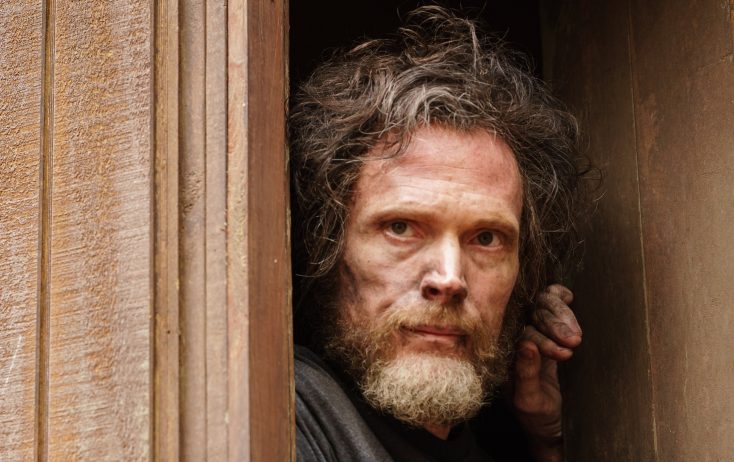By JUDY SLOANE
Front Row Features
BEVERLY HILLS, Calif.—British actor Paul Bettany has had an eclectic career, with his amusing performance in 2001’s “A Knight’s Tale”, to his dramatic turns in “A Beautiful Mind” (2001) and” Master and Commander: The Far Side of the World” (2003), not forgetting his appearances in such popular sci-fi movies as “Avengers: Age of Ultron” (2015) and Captain America: Civil War (2016).
Now in one of his most challenging roles, Bettany stars in the Discovery Channel’s new eight-part miniseries, “Manhunt: Unabomber,” portraying Ted Kaczynski, the deadliest serial bomber in history. Kaczynski terrorized the nation between 1978 and 1995, killing three people, and injuring 23 more in a series of mail bombings.
The miniseries focuses on Kaczynski’s life and FBI Agent and Criminal Profiler Jim Fitzgerald, played by Sam Worthington (“Avatar,” “Hacksaw Ridge”), who brought him to justice.
Paul Bettany dropped by the TV Critics Association to talk about his new thriller, which premieres on Tuesday, August 1 at 9 p.m. ET/PT on the Discovery Channel.
Q: How did you get into the mind of Ted Kaczynski?
Bettany: There were a bunch of things. Some things were more helpful than others, and some things were a total waste of time and dead ends. The two most interesting things were, “A1,” his unpublished autobiography. I have excerpts from that which were incredibly honest and revealing. When Ted Kaczynski was arrested, of course the FBI itemized everything that was in his 10-by-8 (foot) cabin. And I had access to his reading list, and that was fascinating. The novels that he had chosen to keep quite literally around his head, above his bed, were fascinatingly clichéd in that they were like Joseph Conrad’s “The Secret Agent,” Fyodor Dostoyevsky’s “Crime and Punishment” and Arthur Koestler’s “Darkness at Noon.” They were all novels about a man who feels like an alien in society and commits a crime that he can’t come back from. That was really useful for me.
Q: When you play someone who is so hated, do you try to find some good in him, or do you even think about it?
Bettany: That’s what attracted me to the script. What was fantastic about eight hours of television is if you were making this as a movie, it would almost certainly become a thriller with dogged maverick cop chasing monster, right, because you’ve got to do this in an hour and a half, two hours? But having eight hours allows the freedom to look at the domestic life of Special Agent Fitzgerald and the toll it takes on his family and his wife and children. It also allows you to spend some time with Ted Kaczynski and see what his domesticity was like and also what his childhood was like. I don’t think that I or the show are trying to engender any sympathy for Ted, but certainly asking you have empathy for this child. And what happened to that boy was very damaging, and somehow it can be separated from the, I think we can agree, monstrous acts in his later life.
Q: What was it like to act in the re-creation of Ted’s cabin?
Bettany: The cabin really felt like its own character and absolutely a place of safety for Ted. I think Ted felt incredibly isolated. And if you are feeling isolated in a city, your sense of alienation and isolation is endlessly pointed out to you. It makes sense to feel lonely in the woods on your own in a cabin, right? You are not challenging that bit of you that isn’t able to commune with other people, so for him it was a place of safety.
Q: What would it be like for you if you were living in a cabin like that?
Bettany: I would not be up to that. He lived in a 10-by-8 cabin with no running water or electricity for 20 years and maintained the longest bombing campaign in U.S. history. That’s extraordinary. He made those bombs (by) soldering a piece of rebar on his potbelly stove. He made the epoxy out of the hooves of animals and the bombs out of minerals from the roots of mushrooms.
Q: Did you try living in the woods to just see how it felt?
Bettany: I (did) live in a cabin in the woods. I would like to clarify that it was a very, very nice cabin with a pool. I experimented by absolutely turning off my phone and not being in contact with my family even for three days. The amount of time there is in a day is extraordinary. Coming into work on Monday morning, my voice was sort of cracking because I hadn’t needed to use it for three days. It was just some sort of ******** attempt to try and get a pinch of what that kind of aloneness feels like, because I’ve got three kids, a dog, a cat and a wife. There’s no aloneness in my life.
Q: Do you his manifesto was taken seriously in its time? Just the idea that he got two newspapers to print it in its entirety was kind of amazing.
Bettany: Oh, yeah, important reviewers reviewed it. I think it’s hard to judge how much of his philosophy is a justification for the fury that he’s also feeling at the community. This is a man with an IQ of 168 that could have gone and blown up the national grid and not killed a human being. But he chose human beings. My feeling is it’s very hard to untangle which bit of it is just a justification for this fury that he feels of not fitting in and not being able to be touched by human beings.
Q: Have you received packages from fans, and has this changed your mind about opening those letters and packages?
Bettany: I’ve found really peculiar things in packages. So, yeah, I don’t open them. I get my wife (Oscar-winning actress Jennifer Connelly) to open them just in case. “Honey, this won’t be dangerous.” (He laughs.)






